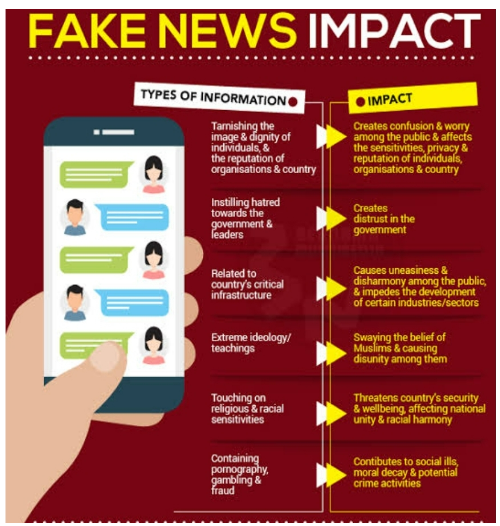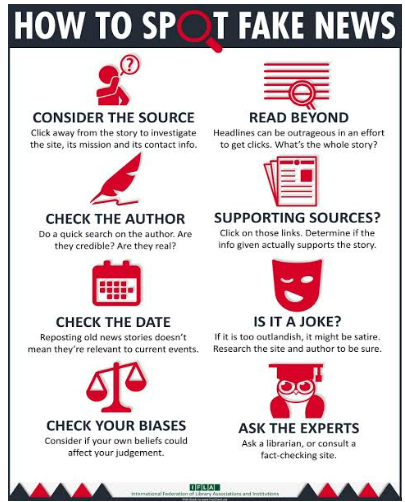Context: There is an increase in cases related to the exploitation of social media for spreading misinformation and fake news.
- In a recent case, a TV anchor was booked by the Karnataka Police for spreading misinformation for political gains.
More about the news:

- The Karnataka government announced the framework for a fact-checking unit to crack down on fake news on social media.
- It comprises an Oversight Committee, Review Single Point of Contact (SPOC), and Nodal Officers. It will be run on content in Kannada, English and other regional languages.
- Social media platforms have now become breeding grounds for the spread of false, misleading, and manipulative information on an unprecedented scale.
What is fake news?
- Fake news: It consists of false information presented as fact to manipulate people intellectually and emotionally sparking strong emotional responses and even violence.
- Disinformation: It is understood as false information that is created or spread with the deliberate intent of causing harm.
- In the case of misinformation, the element of intent is considered to be absent.
|
Impacts of fake news:
- Manipulating views of public: It exposes people to biased information that confirms their existing beliefs, reinforcing their preconceptions and polarisation of society.
- Fake videos were shared by media sources like the BBC in many parts of India which led to mischief to public property and the killing of innocent people.
 Economic impact: It can lead to market volatility and economic ramifications.
Economic impact: It can lead to market volatility and economic ramifications.- Fake images depicting an explosion near the Pentagon in the US led to the manipulation of the stock market and destabilisation of the economic parameters.
- False information regarding COVID transmission through chickens spread during pandemic caused anxiety and led many people to temporarily or even permanently stop consuming chicken.
- As reported by the ICAR-Central Avian Research Institute, this had a severe impact on the poultry industry, resulting in estimated losses of over $3 billion.
- Threat to internal security: Fake news is disseminated by non-state actors especially Pakistan and China for radicalization and promoting propaganda against India.
- Example- After revocation of Article 370 of the Indian Constitution.
- Role of Deep fakes: Deepfakes are realistic-looking videos or images that have been manipulated to show something that did not actually occur.
- The surge of false videos depicting the Hindi-speaking labourers in Tamil Nadu, falsely portraying them as victims of attacks, is trying to create tension between Tamils and migrant workers in Tamil Nadu.
- AI-generated Islamophobia: Deepfake images being used to hurt the sentiments of the Muslim community.
- Communal disharmony and social division: It has caused harmful incidents like mob lynching, communal riots, public and private loss of property due to the antisocial conduct of some people.
- In 2018, two people lost their lives in mob attacks linked to WhatsApp rumors in Assam.
- Narrowing down media diversity: The Artificial algorithms favour specific news stories or sources, leading to narrowing of perspectives and reinforce inequalities and biases.
- Ex- During Donand Trump’s election.
- Privacy Violations: During pandemic, medical records of Covid-19 positive individuals were circulated online compromising their privacy.
Legal Measures to curb fake news:
- Indian Penal Code(IPC) Section 153A: It criminalises acts that promote hatred between different religious, racial, or linguistic groups, and actions.
- Section 69A of the Information Technology Act, 2000: It blocks access to information online necessary in the interest of the safety and the security of the state.
- Disaster Management Act 2005 (DMA): It deals with false warnings around a disaster leading to panic.
- Information Technology Rules(IT), 2021: It regulates content by online publishers of news and social media intermediaries.
- Information Technology (Intermediary Guidelines and Digital Media Ethics Code) Amendment Rules, 2023: It regulates fact checking of “false”, “fake” or “misleading” information related to the Union Government.
- Digital Personal Data Protection Bill 2023: It has provisions to curb the misuse of individuals’ data on online platforms.
Global Measures to Curb Fake News:
- European Union: It has put out the Code of Practice on Disinformation 2022.
- It includes transparency in political advertising, empowerment of fact-checkers and researchers, tools to flag disinformation, and measures to reduce manipulative behaviour.
- United Kingdom: It has proposed enacting an Online Safety Bill under which social media platforms will actively monitor problematic content.
|
Way Forward:

- Verifying information Source: Media organizations should prioritize regular fact-checking and work on raising public awareness about the issue.
- Conducting a reverse image search on Google to determine the source of content before sharing it. Tools like Invid can be useful in exposing fake videos.
- Google has introduced the ‘About This Result feature’ that will let users evaluate the information and understand its source.
- Fact Checking Standards: India needs to develop a framework based on international best practices like the IFCN (International Fact-Checking Network) code of principles for fact-checking.
- Robust Legislative framework: It is needed to maintain a balance between free speech and protecting citizens from falling prey to malicious disinformation.
Tehseen S. Poonawalla vs Union Of India (2018):
- The Supreme Court had held that it is the duty of the Union and State governments to take steps to curb dissemination of fake news and disinformation.
|
- Awareness Programs: Broader awareness campaign involving everyone to educate society about the laws and rules concerning fake posts and the harm they can cause.
-
- Under Article 51A (h) of the Constitution of India, it shall be the duty of every citizen to develop the scientific temper, humanism and the spirit of inquiry and reform.
- FactShala, a collaborative and multi-stakeholder media literacy network and Google will develop training modules to help users effectively spot disinformation.
- Capacity Building of Law Enforcement Agencies: They must take action against those who create and spread fake content, and for that, they need to increase their numbers and their expertise.
- Regulation of Digital Media: Platforms like Facebook and Google in India announced the formation of an Information Trust Alliance (ITA) to combat fake content.
- It is the time to develop and strengthen this initiative.
News Source: Indian Express
![]() 15 Sep 2023
15 Sep 2023

 Economic impact: It can lead to market volatility and economic ramifications.
Economic impact: It can lead to market volatility and economic ramifications.